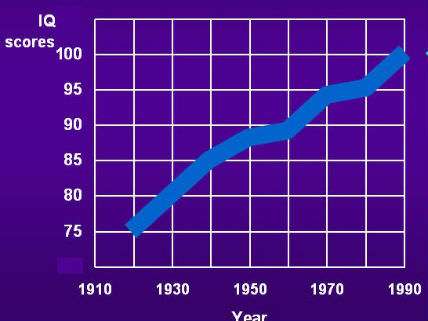Average IQ Scores Have Risen 30 Points During the Past 100 Years
Did folks back in 1900 really have IQs averaging 70 points?

New Zealand political scientist James Flynn realized back in the 1980s that IQ tests are periodically re-normed to 100 points as average. The re-norming all went in one direction: upward at a rate of about 3 points per decade. This insight meant that person making an average score of 100 in 1965 would likely score just 85 points on today's tests. A new study in the journal Perspectives in Psychological Science analyzes the results of 271 independent samples, totaling almost 4 million participants, from 31 countries. They find that average IQ test scores have increased by 30 points over the past century. From the abstract:
The Flynn effect (rising intelligence test performance in the general population over time and generations) varies enigmatically across countries and intelligence domains; its substantive meaning and causes remain elusive. This first formal meta-analysis on the topic revealed worldwide IQ gains across more than one century (1909–2013), based on 271 independent samples, totaling almost 4 million participants, from 31 countries. Key findings include that IQ gains vary according to domain (estimated 0.41, 0.30, 0.28, and 0.21 IQ points annually for fluid, spatial, full-scale, and crystallized IQ test performance, respectively), are stronger for adults than children, and have decreased in more recent decades.
Before concluding the people living 100 years ago were nearly all feeble-minded, the press release from the University of Vienna cautions:
The study results showed an average increase of about three IQ points every ten years. But do these results mean that an average IQ test result of 100 points in the present day would translate into an IQ of 130 a century ago? Although gains of about 30 points over a hundred years might suggest so, such an interpretation seems unlikely. Rather than increases in general cognitive ability, these gains are more likely to reflect improvements in specific abilities. "A person with an average IQ score of 100 in the early 20st century might have had quite different capabilities than a person with a seemingly equivalent IQ score of 70 in the present day", explain Jakob Pietschnig and Martin Voracek of the University of Vienna. IQ gains thus appear to be hollow in terms of global cognitive ability changes. Higher IQ test scores are more likely reflective of increasing specialization and better test taking strategies of participants.
The causes for this increase are numerous, including reduced childhood exposure to infectious diseases, better nutrition, more schooling, and vast exposure to more complicated media.


Show Comments (111)